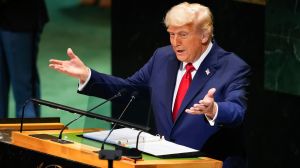More problem now as banks reject transfers
As the Hamas-led government struggles to raise cash after the suspension of Western aid to the Palestinian Authority, it faces a new and unexpected obstacle: banks here are refusing to accept its money transfers from abroad.

As the Hamas-led government struggles to raise cash after the suspension of Western aid to the Palestinian Authority, it faces a new and unexpected obstacle: banks here are refusing to accept its money transfers from abroad.
The US treasury last month barred almost all financial dealings with the Palestinian Authority in response to Hamas’s rise to power, under a federal law that makes it a crime to provide funds to terrorist groups. That has rattled local banks, which are tied to the US banking system.
The banks abruptly stopped handling even basic wire transfers needed for the authority to receive money donated by foreign countries. In recent weeks Arab countries, coordinated by the Arab League in Cairo, have raised more than $70 million.
But so far, Palestinian officials say, no bank has been willing to move the money to the West Bank or the Gaza Strip, wary of legal entanglements with the United States. Ismail Haniya, the Palestinian Prime Minister and a leader of Hamas, said on Wednesday that the government could begin paying overdue salaries, which are now two months late, if the money reached the Palestinian Authority’s bank accounts. “The problem is not with raising money,” Haniya said at a news conference in Gaza City. “The problem is how to transfer this money to the Palestinians.” Haniya accused the United States of putting pressure on the banks “so that the money we have collected does not reach citizens or civil servants”. Hamas says it will not bow to political pressure from Israel or the West. But without money from abroad, it is not clear how the Palestinian Authority can function.
The European Union joined the US in suspending all financial assistance for the authority after Hamas took office in late March. Israel has also frozen the roughly $50 million it collects in tax and customs revenues each month on behalf of the Palestinians. Now, with the US treasury’s action, even Arab and Muslim countries that want to assist the authority have not been able to deliver their aid. American diplomats say the US is not directly putting pressure on the banks. But the treasury has publicised the government’s position that Hamas is a terrorist organisation and that financial transactions with the Palestinian Authority are barred. There are a few exceptions to the ban, including dealings with the Palestinian Authority president, Mahmoud Abbas, who opposes violence against Israel and supports peace talks.
“If an organisation or individual is facilitating direct fund-raising for Hamas, they open themselves up to action by the United States,” said Molly Millerwise, a spokeswoman for the Treasury in Washington. On Tuesday, Stuart Levey, the under secretary for terrorism and financial intelligence at the treasury, was in Israel to meet with senior Israeli officials on how to prevent money from reaching designated terrorist groups, the United States Embassy said.
Many Middle Eastern banks have branches in the US or have business relationships with American banks to handle international transactions. Banks fear they could jeopardise their ties to the US or put themselves at legal risk if they handle money for the Palestinian Authority, regardless of its origin, said George Abed, governor of the Palestinian Monetary Authority.
The Palestinian Authority needs at least $150 million a month just to pay salaries and run essential institutions like schools, hospitals and the police force. On its own the authority raises barely $30 million a month, and it is falling deeper into debt each day. Since coming to power, the Hamas-dominated government has missed two paydays for the authority’s 1,65,000 employees. Palestinian nurses and teachers, civil servants and security force officers like Muhammad Burbar, 23, are caught in the middle. Burbar has not received his monthly $333 paycheck since February. He is out of cash, and his wife needs medical treatment. On Tuesday the couple sold a tiny gold bracelet and a pendant they bought for their daughter. “We didn’t have any other choice,” he said.GREG MYRE
Photos



- 01
- 02
- 03
- 04
- 05




























